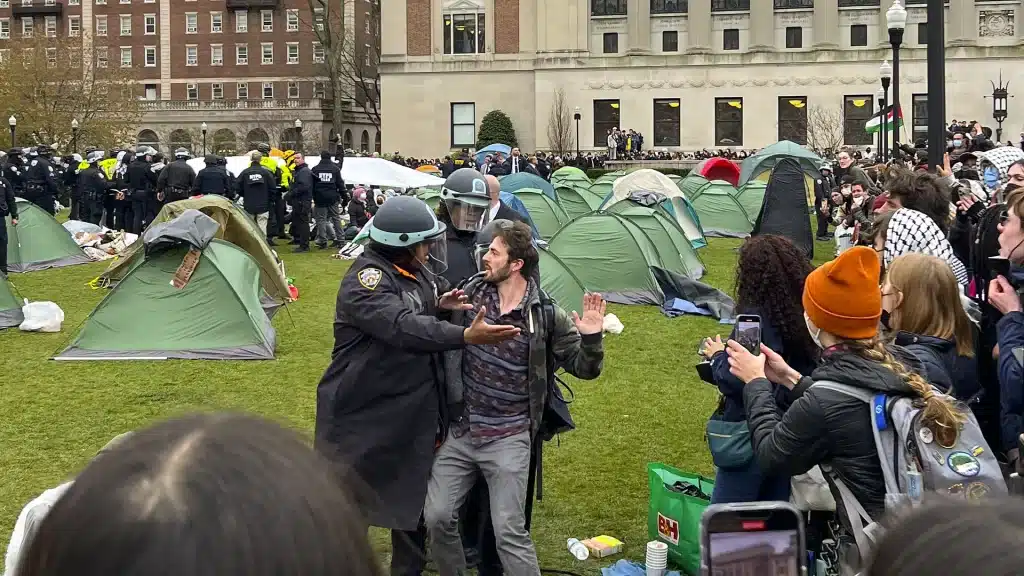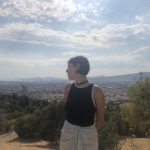Columbia University has made national and international headlines for both the combative student movement which arose in opposition to Israel’s genocidal assault on Gaza and for the administration’s brazen attacks against student activists. On April 18, the university sanctioned the repression of hundreds of students and called the NYPD to arrest over 100 students who helped organize the student-led occupation dubbed the “Gaza Solidarity Encampment.” This repression has become the latest flashpoint in the university’s offensive against the movement. It also marked the first authorization of police repression within the campus in decades.
Columbia students organized the occupation of East Butler Lawn to call for divestment and denounce the suspension and eviction of six Columbia students earlier this month. They began their occupation on the morning of the congressional hearing that Columbia president, Nemat “Minouche” Shafik, participated in.
In December, the House of Representatives Committee on Education & the Workforce held a hearing to grill the university presidents of Harvard, UPenn, and MIT and pressure them to crack down on pro-Palestine protesters at their universities. After being slammed in Congress for not going “all-out” to discipline the movement, the presidents of Harvard and UPenn were pressured into resigning. Shafik, hoping to avoid the same fate, went further than the presidents of the other elite universities and committed to disciplining Columbia faculty members Joseph Andoni Massad and Katherine Franke, and firing professor Mohamed Abdou.
Both Republicans and Democrats in Congress praised the remarks of Columbia administrators, who promised to curtail academic freedom in the name of confronting “anti-semitism.” The bipartisan congressional witch hunt is now extending to K-12 school districts, whose administrators from cities like New York will face a similar congressional hearing on May 8.
The Congressional hearings are important for the Biden administration, which is trying to contain the unprecedented movement in solidarity with Palestine, especially before the elections. The bipartisan regime is pressuring academic bureaucracies across the country to crush the incipient student movement — which plays an important role in pro-Palestine protests — on their behalf. At the same time, the Democratic Party is trying to divert the movement through co-optation by putting forward rhetorical concessions around the ceasefire demand, trying to channel the movement off the streets and into the ballot boxes through the uncommitted campaign of the left wing of the Democratic Party, and by offering concessions like Biden’s newly proposed student debt relief package.
The McCarthyist offensive sweeping universities, workplaces, and the streets is key for the bipartisan regime because it puts them in a better position to attack movements that question their interests in the future. At the same time that universities are being attacked, the right to protest is being attacked in three states. This week, the Supreme Court announced it will not hear Mckesson v. Doe, which leaves in place a lower court decision to effectively eliminate the right to organize a mass protest in the states of Louisiana, Mississippi, and Texas.
McCarthyism, political persecution, and state repression infringing on basic democratic rights have a long history in the U.S. — despite the country being hailed by even sectors of the left as a “citadel of democracy.” The Kent State Massacre, which left four university students dead at the hands of the national guard, escalated the movement against the war in Vietnam, and after BLM, a slew of laws were passed across the country which restricted the right to mobilization and free speech.
In universities, administrators are recalling old-school and Orwellian intimidation tactics like interrogations and surveillance of technology, including email accounts. As one of the recently-suspended Columbia students recounted to Left Voice, university groups are also receiving threatening emails from campus authorities to dissuade student activism.
Already, the recent events at Columbia are sparking the outrage of broad sectors, including some faculty at the university who have differing views on Palestine. Public figures like Cornel West and Ilhan Omar have spoken out in solidarity with those facing attacks. Ilhan Omar’s own daughter, a student at Barnard College — a college of Columbia — was suspended after her mother’s remarks, showing the targeted nature of the attacks.
Shafik, who sent an email to the university before ordering the police repression of the occupation, tried to convey a regretful tone and paint the students mobilizing as “bad apples” within the Columbia community. But the administration knows exactly what it’s doing and who it’s going after – anyone that speaks out in solidarity with Palestine.
Columbia University’s Inextricable Links to Zionism and Israel
Columbia University has been an important site of struggle for the Palestine solidarity movement. On one hand, it is an elite institution older than the country itself which plays a key role in the functioning of the capitalist regime; it is the alma mater of several former presidents; it is a place where you can brush elbows with war criminals like Hilary Clinton; and its donors enjoy close financial ties with the state of Israel. On the other hand, Columbia has a politicized student body with an important tradition of struggle, and it is the academic home of a number of prominent pro-Palestinian thinkers.
In keeping with the university’s ties to the bipartisan imperialist regime, Columbia’s president, who is the first Arab to lead an Ivy League institution and the first woman to lead Columbia, is also a former director of both the World Bank and International Monetary Fund. Both these institutions play a central role in maintaining the imperialist oppression of dependent countries by promoting austerity policies that benefit the profits and interests of big multinational corporations tied to imperialism.
These characteristics make Columbia an important place in the solidarity struggle with Palestine. They expose the relationship between the imperialist regime and the academic bureaucracies, as well as the contradictions between the administrations who protect the interests of the bipartisan regime and their student bodies, which are playing a disruptive role due to their growing sensibility against the interests of U.S. imperialism, as evidenced by the pro-Palestinian movement.
These tensions had already come to a head at the height of the movement when Columbia decided to take a heavy-handed approach and ban outright Jewish Voice for Peace (JVP) and Students for Justice in Palestine (SJP) from its campus, creating a manual for other universities to do the same. In recent months, the movement has experienced a downturn on the streets, yet there are still a number of radical actions that express the depth of hatred toward the genocide aided and abetted by U.S. imperialism.
But the occupation at Columbia and the subsequent repression has put the university at the center of a storm. The occupation revives both the radical tradition of Columbia’s 1968 occupation and also the trauma of the brutal crackdown in which the police, with the university’s blessing, violently removed the occupation, ending it with one of the largest mass arrests in New York City’s history.
The regime and its proxies are trying to repress the most radical sectors of the current movement in order to reduce their influence on the masses and workers, demoralize the sectors still mobilizing, and divide the “good” protesters (the ones who write their congressperson and vote uncommitted) from the “bad” protesters (the ones who disrupt the streets and occupy campuses and workplaces, like Google workers did this past week). We need a perspective that unifies all the sectors under attack with all conscious sectors disgusted by the infringement of basic democratic rights. This comes in a moment where companies like Google are firing workers outright for their views, and groups like Within Our Lifetime are being banned from Instagram for bravely mobilizing against the genocide. It’s time to organize against this witch hunt in a coordinated way.
Defending the Right to Protest is Defending Palestine
While it remains to be seen how the situation will develop at Columbia and whether more students and academic workers will be reprimanded, this week shows the level of repression that the academic bureaucracies, bosses, and the bipartisan regime are looking to unleash on the movement. As the Biden administration tries to build an electoral campaign around “defending democracy” here and around the world, it begs the question, a democracy for whom? Clearly, this is not a democracy for pro-Palestine activists, workers, and students.
It’s clear that a country that can’t even afford basic human rights to its own citizens, that funds and supports brutally oppressive regimes like Netanyahu’s in Israel, a country that inspires other countries like France and Germany to also ban the right to protest, is anything but a true democracy. As the popular saying goes, “NYPD, KKK, IDF are all the same” – the same police that repress us here are trained by the police that repress Palestinians. Without a doubt, our struggles are innately connected.
The current struggle in defense of our right to speak out, to protest, to not fear facing censorship, criminalization, or persecution where we work, study, and live, is an urgent priority. We can’t let them call us “terrorists” while they are the ones sending bombs to kill innocent Palestinians. We can’t leave ourselves without a voice in the midst of a genocide.
We can’t let these attacks against activists fly or become a part of our common sense. Columbia University is becoming the epicenter of an incipient movement against repression. We need to take this momentum and build a bold, broad, and coordinated national campaign that brings together public figures, unions, activists, the academic community, and beyond, to fight with one fist against the offensive that’s trying to squash our movement. The statement from the Student Workers of Columbia recently published can be the basis for the type of democratic campaign that is needed to protect the right to speak out for Palestine.











